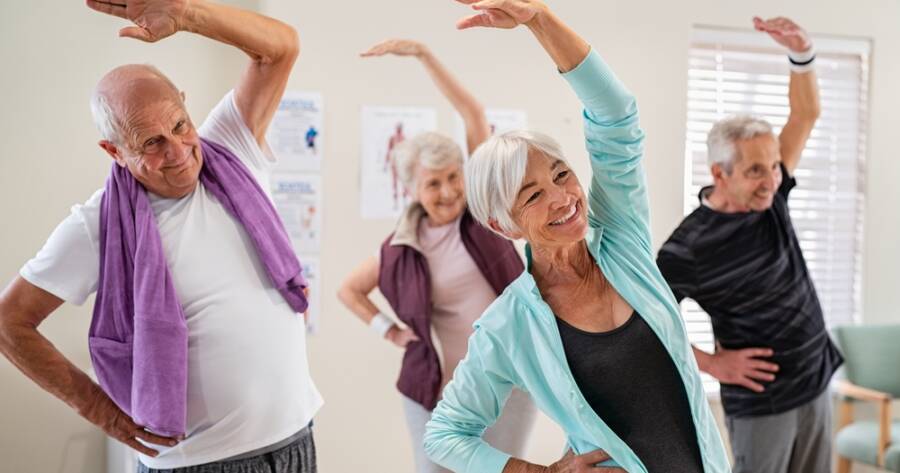Regular exercise is essential for seniors to maintain their health, independence, and overall quality of life. Engaging in physical activity helps improve strength, balance, and flexibility, all of which are critical for performing daily tasks and reducing the risk of falls. Beyond physical benefits, exercise also enhances mental well-being by elevating mood, reducing stress, and improving cognitive function. Staying active enables seniors to remain self-sufficient, socially engaged, and better equipped to enjoy their golden years with vitality and confidence.
What Are the Best Exercises for Seniors?
As people age, it becomes increasingly important to maintain physical fitness and overall well-being. Engaging in regular exercise can significantly benefit seniors by improving their physical and mental health. Some of the most effective exercises for seniors include:
- Aerobic activities: These exercises help to strengthen the heart and lungs, and can include walking, swimming, cycling, and dancing.
- Strength training: This type of exercise helps to build and maintain muscle mass, which is essential for mobility and independence. Seniors can engage in strength training using weights, resistance bands, or even their own body weight.
- Balance exercises: These exercises help to improve balance and coordination, which can reduce the risk of falls. Some examples of balance exercises include standing on one leg, walking heel-to-toe, and tai chi.1
- Flexibility exercises: These exercises help to improve flexibility and range of motion, which can make it easier to perform everyday activities. Seniors can engage in flexibility exercises such as stretching, yoga, and Pilates.
Exercise for Seniors: Improving Health and Well-being
Regular exercise has been shown to provide numerous benefits for seniors, including:
- Improved cardiovascular health: Exercise can help to lower blood pressure, reduce cholesterol levels, and improve circulation.
- Increased muscle strength and flexibility: Exercise can help to build and maintain muscle mass, which is essential for mobility and independence. It can also improve flexibility and range of motion, making it easier to perform everyday activities.
- Reduced risk of falls: Balance exercises can help to improve balance and coordination, which can reduce the risk of falls. Falls are a major cause of injury and disability among seniors.2
- Improved cognitive function: Exercise has been shown to improve cognitive function and reduce the risk of dementia. This is because exercise increases blood flow to the brain, which helps to improve memory and thinking skills.
- Enhanced mood: Exercise can help to improve mood and reduce stress levels. This is because exercise releases endorphins, which have mood-boosting effects.
Balance and Strength: The Most Important
Balance and strength are two fundamental components of physical fitness for seniors. Balance exercises can help to improve coordination and reduce the risk of falls, while strength training can help to build and maintain muscle mass, which is needed for mobility and independence.
Some specific examples of balance exercises for seniors include:
- Standing on one leg
- Walking heel-to-toe
- Tai chi
- Yoga
- Pilates
Some specific examples of strength training exercises for seniors include:
- Lifting weights
- Using resistance bands
- Bodyweight exercises such as push-ups, sit-ups, and squats
Learn More About Exercise for Seniors
There are endless resources available to support seniors in learning more about exercise and how to begin a fitness routine tailored to their needs. The National Institute on Aging (NIA) website offers a wealth of information specifically designed for older adults, providing tips and guidelines for safe and effective exercises. Similarly, the Centers for Disease Control and Prevention (CDC) website provides valuable insights into the benefits of physical activity and offers recommendations for staying active as we age.
In addition to these online resources, consulting with your doctor or a physical therapist is a must for receiving personalized advice that takes into account any specific health conditions or limitations. These professionals can help create a safe and effective exercise plan that aligns with your individual needs and goals.
Local senior centers or fitness centers often offer programs and classes specifically designed for seniors, providing not only physical activity but also social interaction and support. Engaging with these resources can help seniors build confidence in their abilities and stay motivated on their journey to a healthier, more active lifestyle. Whether you’re just getting started or looking to enhance your existing routine, these resources are excellent starting points for seniors committed to maintaining their health and independence.
